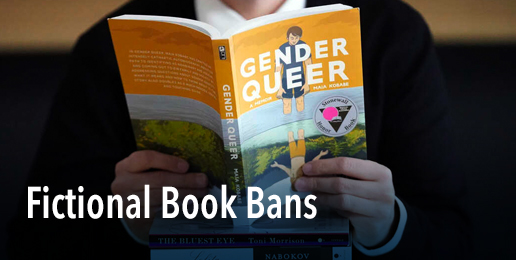
Alexi Giannoulias, Illinois Secretary of State, recently testified before a U.S. Senate Committee on the issue of how to determine what books belong in libraries and who determines what stays and what goes.
Under questioning by U.S. Senator John Kennedy (R-LA), Giannoulias found himself at a loss for words after Kennedy read obscene passages from two controversial books, Gender Queer and All Boys Aren’t Blue, often found in public and school libraries.
Recently passed, the Giannoulias-backed, legislation would make it difficult for any library boards in Illinois to remove these and similar books from the stacks. (see testimony here –Warning: Senator Kennedy reads explicit language without redaction.)
At the hearing, Giannoulias said he was proud of the legislation, which he had proposed and which Governor JB Pritzker just signed in June, and he urged all States to follow Illinois’ lead. As to book banning, he said,
“We solved the problem in Illinois, we fixed it.”
He is delusional if he actually thinks that.
The legislation, HB 2789, passed completely on partisan lines. In the House, 35 Democrats cosponsored the legislation. In the Senate, 20 Democrats. In both houses, of those who voted and almost all did, all Democrats voted for the bill and all Republicans voted against it.
So, there’s definitely no unity on how to address this issue. Once again, our Illinois elected officials turned an issue that should be focused on protecting children, into a political cage fight.
The law will defund any Illinois library that does not follow the American Library Association’s Bill of Rights. That law states:
“It is further declared to be the policy of the State to encourage and protect the freedom of libraries and library systems to acquire materials without external limitation and to be protected against attempts to ban, remove, or otherwise restrict access to books or other materials.”
The alternative to adopting the full ALA Bill of Rights is for the Library Board to:
“develop a written statement prohibiting the practice of banning books or other materials within the library or library system.”
What does this mean?
The ALA published a document titled “Interpretations of the Library Bill of Rights.” The most significant part of that interpretation, from the standpoint of protecting childhood innocence, is the section on “Access to Library Resources and Services for Minors.” That section states:
“Library policies and procedures that effectively deny minors equal and equitable access to all library resources available to other users violate the Library Bill of Rights. The American Library Association opposes all attempts to restrict access to library services, materials, and facilities based on the age of library users.”
In other words, the American Library Association and the State of Illinois believe that children of any age should have access to any book, magazine, document, electronic file, or whatever, regardless of the content. Obscene material, just fine. X-rated movies, all good. Guidance on bomb-making, knife fighting, burglary techniques? Who cares?
Do those who voted for this bill know this?
Do those who voted against it know the implications?
This bill not only makes it ok for libraries to make obscene material available to children. It requires librarians to make these books available to them. Again:
“Library policies and procedures that effectively deny minors equal and equitable access to all library resources available to other users violate the Library Bill of Rights.”
What happens when Illinois libraries violate the Library Bill of Rights? They lose state funding.
This dispute over what books belong in libraries has been falsely and intentionally defined as the ALA and others protecting a First Amendment right against efforts by a supposed growing cadre of Fascists who are trying to ban books.
There is no such effort. There is no growing cadre of Fascists. The claim is a fiction. It is all a lie.
No book bans are being proposed by conservatives who want to protect children from adult topics.
Conservatives and especially Christians want to shield children from informational burdens they are neither emotionally nor intellectually equipped to carry.
The conservative position is not to ban, but to limit children’s access to adult content, just like motion pictures have been rated and limited to certain age groups.
These books should be adults only, unless the child’s own parents provide the material to them. Children should never be allowed to possess them independently.
Nor do they have any constitutional right to do so.
What is wrong with that?
Why would anyone oppose such efforts to protect children?






















